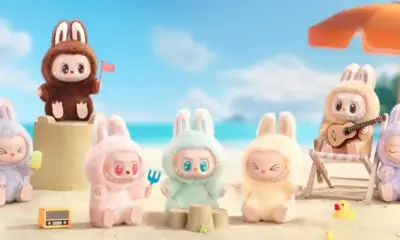Culture
Why Gen Alpha Repeats Slang Nonstop

Why Gen Alpha Repeats Slang Nonstop — And What Parents Should Know
Slang has always existed. Each generation invents odd phrases, strange sayings, and inside jokes that adults never understand. But in today’s digital age, those quirky catchphrases seem louder, more repetitive, and more random than ever. If you live with a Gen Alpha child, chances are you’ve heard them say “sigma,” “sus,” or “six seven” more times than you can count.
These phrases may sound meaningless, but they serve a purpose for our kids. Repeating slang, memes, or internet catchphrases is more than just silly fun. It’s a form of connection and expression. Whether you call it “brain rot” or linguistic play, one thing is clear: Gen Alpha repeats slang with a frequency that baffles many parents.
Why Does Gen Alpha Repeat Slang So Often?
There’s a real reason why kids latch onto phrases like “what the sigma?” and say them dozens of times daily. According to child psychologists, repeating slang can feel satisfying, silly, or simply fun for kids. These phrases often come with catchy rhythms or sounds that stick in the mind.
“Some slang phrases are just amusing to say,” explains Dr. Carolina Estevez, a licensed clinical psychologist. “They’re rhythmic, funny, or linked to viral trends.”
Kids may not even notice how often they repeat these phrases. They’re not trying to confuse you or act strange. They’re just enjoying language the same way kids always have—by repeating what’s popular with their peers.
How Viral Phrases Hook Kids In
Gen Alpha doesn’t just hear slang at school anymore. Today’s youth grow up surrounded by TikTok videos, YouTube shorts, and meme culture. Every scroll exposes them to new trends, new catchphrases, and new reasons to say “clock it” for the tenth time in one hour.
Speech-language expert Ryann Sutera adds that these viral phrases often feature phonological traits—like rhythm, repetition, or novelty. These elements create pleasure in the brain’s sensory-motor system. In short, it just feels good to say them.
So, when Gen Alpha repeats slang, they’re responding to more than humor. They’re also enjoying how the words sound and how they feel when spoken.
Why The Repetition Seems Random
Parents often complain that their kids shout phrases like “ballerina cappucina” or “helly no” without context. You’re not alone in wondering why they do this.
Dr. Estevez explains that kids experiment with language in fun, creative ways. Shouting out a phrase randomly can entertain themselves, make others laugh, or just pass time. It may seem meaningless, but it feels purposeful to them.
Sometimes, saying these things is a form of expression rather than real conversation. Children might not be communicating directly. Instead, they’re engaging with a shared language they feel excited about.
Is This Really A New Behavior?
You might wonder if this compulsive slang repetition is a modern problem. Didn’t we all do something similar when we were younger?
Absolutely. Most adults can remember repeating TV lines or catchphrases from childhood. Think “Cowabunga!” or “No soup for you!” This isn’t a new behavior—just a modern version.
What’s different today is the speed and reach of digital content. Viral trends now cross the globe within minutes. That makes it easier for slang to stick and harder for parents to keep up.
Because of that**,** Gen Alpha repeats slang not more creatively, but more frequently. Their sources are more diverse and faster-moving than previous generations.
Could It Indicate A Deeper Issue?
While most slang repetition is completely normal, parents should pay attention to the context. If your child’s repetition feels disconnected from play or communication, it could be worth monitoring.
Dr. Estevez points out that some children—especially neurodivergent ones—may use repeated phrases to self-regulate, focus, or soothe emotions. In such cases, repetition may resemble echolalia or stimming.
That doesn’t always mean there’s a problem. Many kids repeat for fun without any diagnosis. But if you feel concerned, speaking to a healthcare provider can help determine what’s really going on.
What Should Parents Do About It?
If you’re growing tired of hearing “tralero tralala” every five minutes, take heart. Experts agree that repeating slang is often a harmless and healthy behavior.
“Unless it’s causing distress or significant interference, this behavior should be honored, not discouraged,” Sutera advises. Language play supports development. It helps children regulate emotions, feel connected, and express themselves.
The best thing parents can do? Stay curious, not critical. If it seems quirky but harmless, let them be. If it starts interfering with daily life or feels tied to anxiety, seek guidance.
Bottom Line: Repetition Is Normal—Even When It’s Weird
What may feel like nonsense to us often feels like fun to our kids. When Gen Alpha repeats slang, they aren’t being rebellious or rude. They’re simply exploring the rich, funny, and fast-moving language of their generation.
Kids today grow up in a content-rich world. From memes to shorts to viral audio clips, everything they hear gets absorbed quickly—and repeated often. This is how they bond, regulate, and develop socially.
At the same time, every child is different. Trust your instincts. If something seems off, it’s okay to ask questions or seek support. But in most cases, repetition is a sign of a curious, expressive child enjoying their digital surroundings.
Explore more parenting insights and pop culture trends—visit our site now for the latest updates and expert advice.












